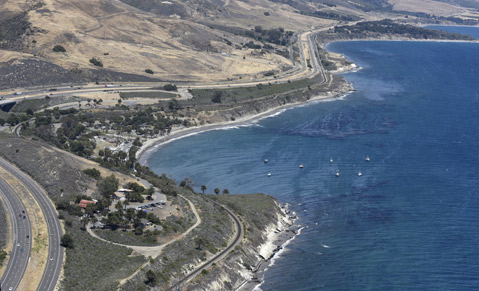Erosion of Power in Refugio Spill Cleanup
Enviros Decry Brown's Crippling of Key Coast Protection Agency

100 feet wide, in the ocean.
Santa Barbara environmental advocates were grateful when Governor Jerry Brown moved swiftly on an emergency order to expedite cleanup of the Refugio oil spill.
Then they read the fine print.
For the first time in history, the governor in his order quietly suspended the landmark California Coastal Act. With the precedent-setting action, Brown crippled the authority of the Coastal Commission to ensure that Plains All American Pipeline meets the coastal law’s toughest-in-the-nation environmental standards in cleaning up and restoring beaches, the broken pipeline site, and nearby habitat damaged by the May 19 spill.

“It makes no sense,” said Susan Jordan, director of the California Coastal Protection Network, “to suspend the very law that was created by a citizen initiative, in response to the massive 1969 oil spill off the coast of Santa Barbara, to address situations like this.
“If anything, this is the time to make certain the Coastal Act’s protective policies are administered and enforced,” she added.
LOWBALL RED TAPE: Announcing his May 20 order, Brown declared that it “cuts red tape.” But he lowballed his undercutting of the commission, tucking that language into section 5 of the document, below eight “whereas” clauses and one “therefore.”
Press Secretary Evan Westrup referred questions about the order to the Governor’s Office of Emergency Services, one of several state agencies within the Unified Command overseeing operations at Refugio beach.
Deputy Director Kelly Huston said the Coastal Commission is “notified” of what is being done under the order, adding that Brown’s exemption action was necessary “in enabling the most effective response by those responsible for emergency response.
“It’s the intent of the administration to ensure the Coastal Commission is actively involved when and where necessary,” he said in an email interview.
However, environmental leaders note that the commission already has a process for verbally granting emergency permits, the purported raison d’être for the governor’s order. Had the commission led the process, Plains eventually would have had to comply with the state’s most stringent regulations for marine, beach, wetlands, and other habitat restoration; now the company possibly could elude them.
“The oil spill resulted from a weakening of oversight of the pipeline,” said Linda Krop, chief counsel of the Environmental Defense Center. “Now is not the time to exacerbate the damage by weakening the Coastal Act requirements for mitigation and restoration.”
SAND AND COBBLE: At first glance, the dispute might seem mere political wrangling, but there is considerable substance to it.
Cleanup and healing of the extensive environmental damage Plains inflicted requires management of a maddeningly complex process, which includes interlocking systems and sciences, from biology, geology, and administrative permit law to metallurgy, pipeline engineering, and an array of health and safety regulations.
The size and shape of berms, the amount of beach kelp available to arthropods that feed baby plovers, even the granularity of sand and cobble, are a few of thousands of factors involved in restoring the coastline and bluffs.
Who controls that process is significant, because it determines what environmental standards Plains must meet; California’s broadest, deepest, most specific and time-tested benchmarks and guidelines derive from the Coastal Act, administered by its commission.
The law was spawned by passage of Proposition 20, a 1972 initiative that for the first time treated California’s 1,057-mile coastline as a system, not a patchwork of stretches governed and shaped by the whims of local politicians.
It passed 55-to-45 percent (Santa Barbara voted 62-38 in favor), following the 1969 Santa Barbara spill, blocking energy company efforts to pack the coast with nuclear plants, and development proposals for hordes of houses, hotels, and condos.
(Slight digression: Then-Secretary of State Jerry Brown boosted Prop. 20 by publicizing major campaign contributions against the measure by special interests. Also notable: A young Governor Brown signed the 1976 legislation enshrining the initiative as the California Coastal Act.)
THIS JUST IN: Some environmentalists note that beyond the oil spill, Brown took similar action recently, exempting his emergency drought order, and even a Los Angeles football stadium, from the keystone California Environmental Quality Act.
“The governor has a penchant for putting loopholes into important environmental laws,” said Patrick Sullivan, of the Oakland-based Center for Biological Diversity.
Last Tuesday, Jordan and Krop released a letter, signed by two dozen California environmental groups, calling on Brown to rescind the suspension.
“With all due respect to the good work of the other state agencies in addressing this oil spill,” said Susan Jordan, “the Coastal Act is not ‘red tape’ and no other state agency is empowered to enforce its legal mandate and protective policies.”



